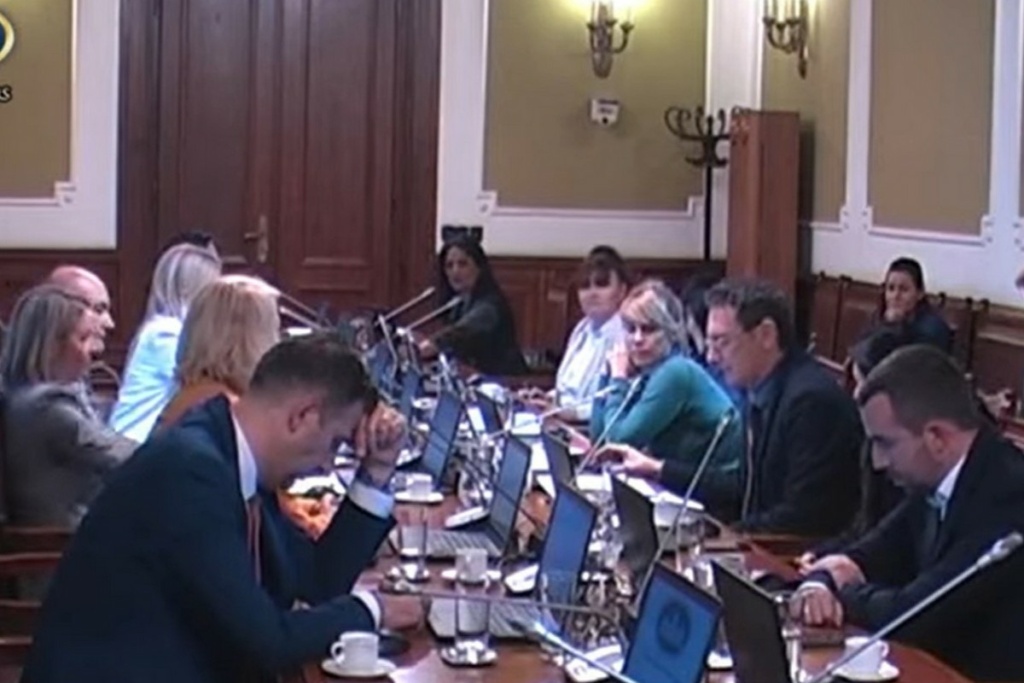
Thousands of people in front of Radio Television of Serbia, RTS, protesting. Photo: BIRN
It is not surprising that most Serbian mainstream media either ignored or only selectively reported on a rally in which more than 10,000 marchers demanded resignations over the controversial demolitions in the Waterfront area
If you only followed the biggest media outlets in Serbia, you would certainly not have learned much about Wednesday’s protest in the centre of Belgrade.
That day, more than 10,000 people demanded resignations of city and state officialsbecause of their silence over the strange events that took place in Belgrade at the end of April.
On the night of April 24, a group of masked men demolished several sites on the riverbank in the Savamala. The city police ignored calls for help and, later, the police, city and state authorities claimed they knew nothing about the events.
Activists from the campaigning group „Let’s not Drown Belgrade“, who organized the latest protest, believe the nocturnal demolition work was carried out to clear space for the Belgrade Waterfront project, a controversial development funded by an investor from the United Arab Emirates.
However, although Wednesday’s protest was large in scale for such a proverbially apathetic society, most mainstream media either completely ignored it, or reported on it selectively.
Viewers of Belgrade city’s television station, Studio B, would not even have known that the protest took place. It did not report about it at all.
On Wednesday evening, while the rally was being held, Studio B instead aired promotional videos about the Waterfront project.
Their editorial choice was interesting since “Let’s not drown Belgrade” is one of the biggest opponents of the Waterfront project – and the whole protest is about accusing the authorities of corruption and violence linked to plans to redevelop a popular area into an upscale housing and shopping complex.
Studio B, widely seen as a symbol of the Serbian capital, was sold last August to the marketing agency, Maxim Media, for 530,000 euros.
Studio B’s importance and reputation grew during the era of Slobodan Milosevic, when it became an emblem of free journalism and independent thought.
However, its reputation has declined sharply since then and many believe that, since privatization, it has became just another openly pro-government mouthpiece.
Serbia’s state news agency Tanjug, which is still producing news and receiving money from the budget – even though the government closed it last October 2015, after failing to find a private buyer – also did not report anything about the protest, although it might have been considered a basic professional duty as a news agency.
Only too aware of Serbia’s problematic media, protesters at Wednesday’s rally staged a march to the headquarters of the media outlets Politika, Novosti and national broadcaster RTS, accusing them of not reporting on the issue.
Jovana Gligorijevic, editor of the weekly Vreme, said on Wednesday that if they relied only on the mainstream media, people would never have found out about the controversial demolitions in Savamala, saying that Serbia’s public broadcaster, RTS, is not fulfilling its duty as an objective public service financed by all citizens.
Journalist Dusan Cavic made a speech noting that RTS is starting to look like the infamous RTS of the 1990s, when Serbia’s authoritarian strongman Slobodan Milosevic controlled it, and when around a thousand journalists were fired for disobedience.
“The public broadcaster is supposed to report objectively and not on the politicians’ orders. That is why we are paying you,” he said.
In fact, RTS did report somewhat selectively on the protest, saying on its website that some protesters “went for a walk in support of journalists” but of course not mentioning the explicit harsh criticism of its own work.
RTS said only in its report that the organizers of the march “were unsatisfied with the work of some journalists”. It did not said how many people gathered at a rally.
Politika, the oldest Serbian daily paper, where the marchers also stopped to express their dissatisfaction with their [non]reporting on the incidents, tucked the news away on page five under the headline “Protest walk in the centre of Belgrade”.
“The initiative Let’s not drown Belgrade gathered several thousand citizens who stopped traffic on the point between the Square of Nikola Pasic to Takovska Street,” it noted.
The question of press freedom is increasingly shaking the media scene in Serbia, as more and more journalists and journalists association complain of censorship and self-censorship.
They also fear that Prime Minister Aleksandar Vucic is tightening his grip on the media, who now overwhelmingly report in favour of him or his party.
Most recently, several journalists association have condemned the wave from dismissals from RTV, the public TV station in Serbia’s northern province of Vojvodina, accusing Vucic’s ruling Serbian Progressive Party of ordering their removal.
The dismissals at RTV came after the Progressive Party won political control of the province following the recent elections, ending 16 years of dominance by the Democratic Party.
Firstly, the TV station’s program director, Slobodan Arezina, was removed on May 5 in what some said was a political move but which the station’s bosses insisted was for „commercial reasons“.
Two weeks later, seven editors of two other shows on RTV were informed by telephone by RTV management on Tuesday that they would not edit their shows the next day.
Almost the entire team of the morning show „Good Morning Vojvodina“ was dismissed, and some journalists at RTV claim there are hints that dismissals will continue.
According to the latest Freedom House report, Serbia is on a list of 19 countries where media freedom declined fastest in the course of a single year.
The government denies putting any political pressure on journalists. However, the excuse that all the staff changes that have taken place during Vucic’s four-year reign are down to „marketing reasons“ – the usual official excuse for sackings – is starting to wear thin.
Source: BIRN



 Medijski amandmani umiru u skupštinskom mraku: Noćno zasedanje Odbora, u četiri čina
Medijski amandmani umiru u skupštinskom mraku: Noćno zasedanje Odbora, u četiri čina Filmovi o novinarima i za novinare
Filmovi o novinarima i za novinare Silovanje ili cenzura: Na šta to smrdi Pepe le Tvor?
Silovanje ili cenzura: Na šta to smrdi Pepe le Tvor?
Ostavljanje komentara je privremeno obustavljeno iz tehničkih razloga. Hvala na razumevanju.